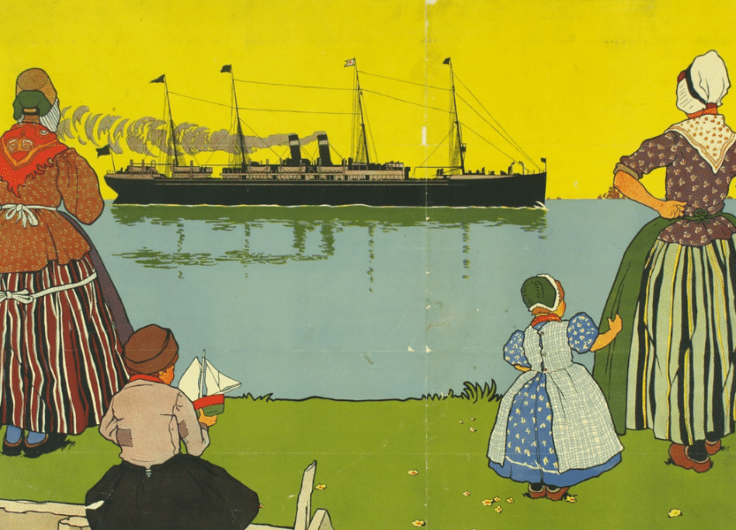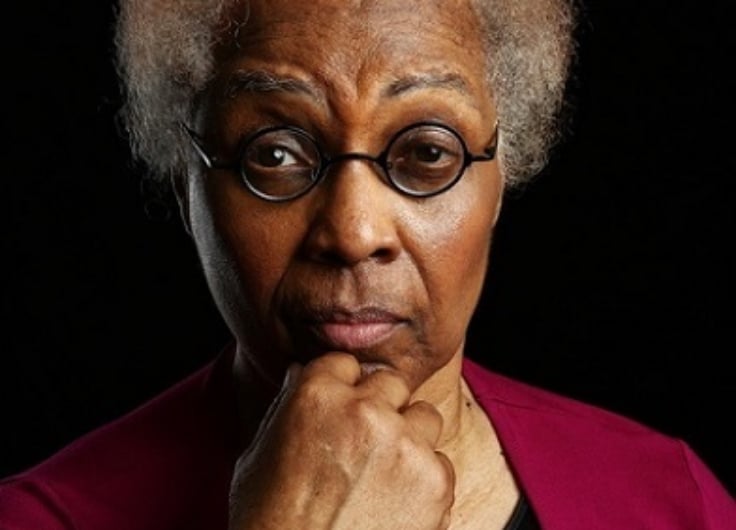An Audible Accent When Speaking Dutch? It Doesn’t Matter
Native speakers of Dutch should adopt a more tolerant and empathetic attitude towards non-native speakers and not judge a speaker by their accent, argues Christopher Joby, a Dutch Studies scholar from Norwich. Let people speak different varieties of Dutch. In the English-speaking world, this has long been taken for granted.
‘Your Dutch is good, perfect, but … you have an accent!’ With these words, spoken in Dutch, a lecturer who identified himself as a native speaker greeted me a few years ago after I had read a paper in Dutch at a conference for Dutch Studies scholars in Poland. My Dutch is indeed good (I often get positive comments about my spoken Dutch), but not perfect. I’m an Englishman – so maybe it’s no surprise that I have an accent.
It turns out in fact that I am not the only non-native speaker about whom a ‘native speaker’ has made such remarks. Two years ago, Dawid Walentek, then a PhD candidate in political science at the University of Amsterdam, made a striking announcement on Twitter: A Dutch radio station had wanted to speak to him because of his expertise, but eventually cancelled the interview because of his accent. That would ‘distract the listeners too much from the content’, they said.
Why are native speakers so concerned about accents?
These two anecdotes beg the question: Why are native speakers so concerned about accents? Is it just a matter of listeners being distracted or is something else going on? They may reflect the idea that native speakers have that there is only one standard or acceptable version of Dutch: the version that is perhaps only spoken in (certain parts of) the Netherlands or even only in the Randstad. If so, it goes against the fact that the Dutch Language Union (Taalunie) regards Dutch as a pluricentric language that does not simply have one standard.
You have an accent!
Unfortunately I was so surprised when I was told about my accent that I didn’t ask the Dutchman why he mentioned it. I do, however, have a few ideas about this. Firstly, the very fact that he said it reflects a cultural difference between the English and the Dutch: the Dutch often give their opinion, even if they are not asked for it. I want to avoid generalizations, and I have Dutch friends and colleagues who do not do this, but I think there is some truth in this observation.
Secondly, I suspect that such a comment has something to do with group formation. Much academic research has been done into the term ‘native speaker’ by, for example, the British sociolinguist, Alan Davies. On the basis of this research, Davies and other scholars argue that the concept of ‘native speaker’ is an idealization and can rarely been found in reality. The language competency of native speakers is in fact not necessarily better than that of well-educated non-native speakers. This has led some researchers such as Davies to talk of the ‘native-speaker myth’. A related term often used in Dutch is ‘mother tongue speaker’ (moedertaalspreker). In the view of some scholars, this, too, is a subjective term which arouses affective feelings and creates a bond between those who identify as ‘mother tongue speakers’.
According to scholars such as Yasemin Yildiz, the idea of the ‘mother tongue speaker’ came to the fore especially in the nineteenth century, when national movements based on language emerged, supported by a national philology, in which a close connection between people, country and language – in German: Eine (Mutter)Sprache, Ein Volk, Ein Land played a central role.
Why do people continue to use the term native speaker and related terms such as mother tongue speaker?
If these academics are right, why, then, do people continue to use the term native speaker and related terms such as mother tongue speaker? This has to do with the role that groups and belonging to groups play in shaping our identity. According to Alan Davies, those who consider themselves native speakers of a language try to distinguish between those who belong to the same group and those who do not. One way they can do that is based on how people talk, more specifically, by accent.
Of course, everyone has an accent. But what is the difference between my Norwich accent and that of native speakers from De Pijp in Amsterdam or the Westhoek in West Flanders? I think there are two. First, there is a spectrum of what is acceptable in terms of accent for native speakers. A broad Amsterdam accent and a solid Flemish accent fall within that spectrum. Still, my Norwich accent and the accents of other ‘foreign’ Dutch Studies scholars or academics such as Dr Walentek fall outside. But I think certain ‘native speaker’ accents – for example, those of people from Maldegem or Izegem in Flanders or Katwijk in Holland – are less intelligible.
In my opinion, the second difference plays a decisive role: autobiography, or where you come from. If I’m right, it makes no difference that our accents are more intelligible than, for example, the Maldegem accent, because our accents simply don’t belong to the accepted varieties of Dutch (varieties that are, by the way, determined by the group of native speakers). Taken together, these two factors mean that we are automatically excluded from the (subjective) group of native speakers. So, I wonder if ‘you have an accent’ is simply a code for ‘you’re not one of us’.
But why, I wonder, do the Dutch place so much emphasis on language to determine to which group they and others belong? In this respect, recent research into Dutch identity by the Dutch Office for Social and Cultural Planning (SCP) is worth mentioning. In 2019, the SCP asked 5,500 Dutch people what they thought was typically Dutch and what was important to them for their sense of belonging to their country. Traditions such as King’s Day and Sinterklaas (Santa Claus) were important to many respondents, but they thought that the most important thing in this regard was the Dutch language.
 But native speakers expect that their peers will not make mistakes, and if they do, it must be a slip of the tongue or slip of the pen. The results from the annual Dutch language dictation competition, Het Groot Dictee der Nederlandse Taal, suggests that the reality is in fact quite different. Pictured: Suzanne Voets, winner of Het Groot Dictee der Nederlandse Taaln 2021
But native speakers expect that their peers will not make mistakes, and if they do, it must be a slip of the tongue or slip of the pen. The results from the annual Dutch language dictation competition, Het Groot Dictee der Nederlandse Taal, suggests that the reality is in fact quite different. Pictured: Suzanne Voets, winner of Het Groot Dictee der Nederlandse Taaln 2021© Marcel Krijgsman / KRO-NCRV
Of course, members of the group like to think that they speak and write in a uniform way, but is that really true? First, as mentioned, there is a wide range of accents. Even if native speakers speak Standard Dutch, it is not difficult to determine which part of the Low Countries someone comes from. Another sign that someone belongs to a group is whether or not they make mistakes. Native speakers expect non-native speakers to make mistakes, emphasising their status as non-native speakers. But native speakers expect that their peers will not make mistakes; if they do, it must be a slip of the tongue or the pen. The results from the annual Dutch language dictation competition, Het Groot Dictee der Nederlandse Taal, suggest that the reality is in fact quite different. In my experience, even well-educated Dutch people (even with PhDs!) do not always use the pronouns hun and hen correctly or begin relative clauses with the correct relative pronoun. Should I draw attention to that? No, not at all. I must also admit that my knowledge of English is not perfect either.
Who decides about the norms?
An important element in forming a group is the creation of norms that determine the group’s membership. Anyone who adheres to those standards is included; those who do not comply (often enough) are not counted as part of the group, in this case, ‘native speakers of Dutch’. Or as Marc van Oostendorp, Professor of Dutch and Academic Communication at the University of Nijmegen, remarked when the Dutch radio station withdrew its invitation to Dr Walentek: ‘The Dutch public broadcasting service has a great desire for uniformity. Everyone should preferably sound like he or she is 43, born in Amersfoort. Anything else distracts from “the content”’.
This search for norms that the self-determined native speakers use to determine who is or is not in the group goes against the position of the Dutch Language Union (Taalunie). This body functions to a certain extent as a guardian of the Dutch language and maintains that Dutch is a pluricentric language: that there is more than one standard variety. Some Dutch speakers and institutions accept this point of view. At a conference on regional varieties of Dutch in Brussels in autumn 2022, there was an interview with Geertje Slangen, language advisor at the Flemish Radio and Television Broadcasting Organization (VRT), on the theme of regional language and public broadcasting. While acknowledging that there are standards for pronunciation, she also spoke of a need to be more accepting of diversity. But not all those who speak Dutch as a first language are moving in this direction.
Do the English provide an example?
Do English (also a pluricentric language) and those who speak it as their first language provide an example here? As an Englishman, I accept that there are many varieties of English. For example, I speak Standard English, but recognize that people from Scotland, Australia and other countries also speak Standard English, albeit a variety that occasionally uses different words and has a different accent from mine. In other words, I need to be tolerant of word choice and accent. English speakers accept that their language is pluricentric and deal with it as such. Now it’s the turn of the Dutch speakers to do the same.
 English speakers accept that their language is pluricentric. Now it’s the turn of the Dutch speakers to do the same, states Christopher Joby.
English speakers accept that their language is pluricentric. Now it’s the turn of the Dutch speakers to do the same, states Christopher Joby.© Matthew Waring / Unsplash
Some readers may object that English and Dutch are very different, that English is a world language while most Dutch speakers live in the Low Countries. But the world is changing. Dutch is spoken as a first or second language in Suriname and the Caribbean, and in migrant communities around the world. Dutch undergraduate courses are offered in more than forty countries outside the Dutch language area. During a recent stay in Leiden, I was struck by the number of people from East Asia. Some will speak English, but others want to speak Dutch. The difference is one of degree and not kind.
I have been trained as a teacher so I am not typical. But I always try to be patient and have empathy with someone who obviously speaks a different language. For example, if I meet a Dutch person, I know after about two seconds of talking with them that they are Dutch. Although many Dutch people speak (sometimes very) good English, their use of syntax, pronunciation and stress are sometimes different from mine. But I don’t feel the need to draw attention to that. If communication is effective, that’s the most important thing for me. The fact that I do not correct an English-speaking Dutch person does not mean that I find their English perfect, merely understandable. If an error gives rise to ambiguity, I would check what they meant, but not comment on their accent. If I did, the conversation might take much longer.
Do not just dismiss us
In quite a few respects, the Dutch embrace diversity. For example, the Netherlands was the first country in the world to legalize same-sex marriage. But in other areas they are less willing to do so. Language is an example of this. Perhaps it’s a matter of celebrating diversity and having a broader, more generous conception of what Dutch is, seeing it as a gift to share with the world, rather than something to be jealously held onto by a self-selecting group.
Dear native speaker, have some patience and empathy with non-native speakers
Perhaps the concept of biodiversity can offer a way forward here. Just as we now want to celebrate and protect the diversity of the living world, we can celebrate the diversity of languages and language varieties. In this respect, we can even coin the word glottodiversity (glôtta means ‘tongue’ in ancient Greek) by analogy with the concept of biodiversity. This is not just a theoretical discussion or game of words but reflects changes in the world. Moreover, as far as Dutch is concerned, by doing this you embrace the fact that people born outside the Dutch language area may love this language just as much as ‘native speakers’. Like me, they may think it sounds lovely and want to speak it in all its diversity.
The conclusion? Dear native speaker, have some patience and empathy with non-native speakers, don’t reject us because our pronunciation is sometimes different from what you are used to. On the contrary, embrace us and our use of Dutch to enrich this wonderful language and the Low Countries.












